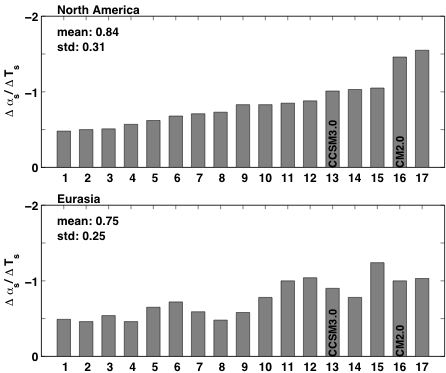
|
||||||||||||||||
|
|

Climate Feedbacks Assessing snow albedo feedback in simulated climate
change Climate feedbacks, such as snow albedo feedback are a prime
reason for the large intermodel divergence in simulations of
future climate. Based on scenario runs of 17 climate models used
in the IPCC
4th Assessment, the two factors which together control
Northern Hemisphere springtime snow albedo feedback in transient
climate change were quantified.
The first factor is the dependence of planetary albedo on surface albedo, representing the atmosphere' s attenuation effect on surface albedo anomalies. We find in all simulations surface albedo anomalies are attenuated by approximately half in Northern Hemisphere land areas as they are transformed into planetary albedo anomalies (see figure above). The intermodel standard deviation in this factor is surprisingly small, less than 10% of the mean. Moreover, when we calculate an observational estimate of this factor using the satellite-based ISCCP data set, we find most simulations agree with ISCCP values to within about 10%, in spite of disagreements between observed and simulated cloud fields. This suggests errors in simulated cloud fields do not result in significant error in this factor, enhancing confidence in climate models. The second factor, related exclusively to surface processes, is
the Therefore this factor is unquestionably the main source of the large divergence in simulations of snow albedo feedback. To reduce the divergence, attention should be therefore focused on differing parameterizations of snow processes, rather than intermodel variations in the attenuation effect of the atmosphere on surface albedo anomalies. Download the publication describing these results in more detail. Xin Qu and Alex Hall make up the team that performed this research. |
|
|||||||||||||


